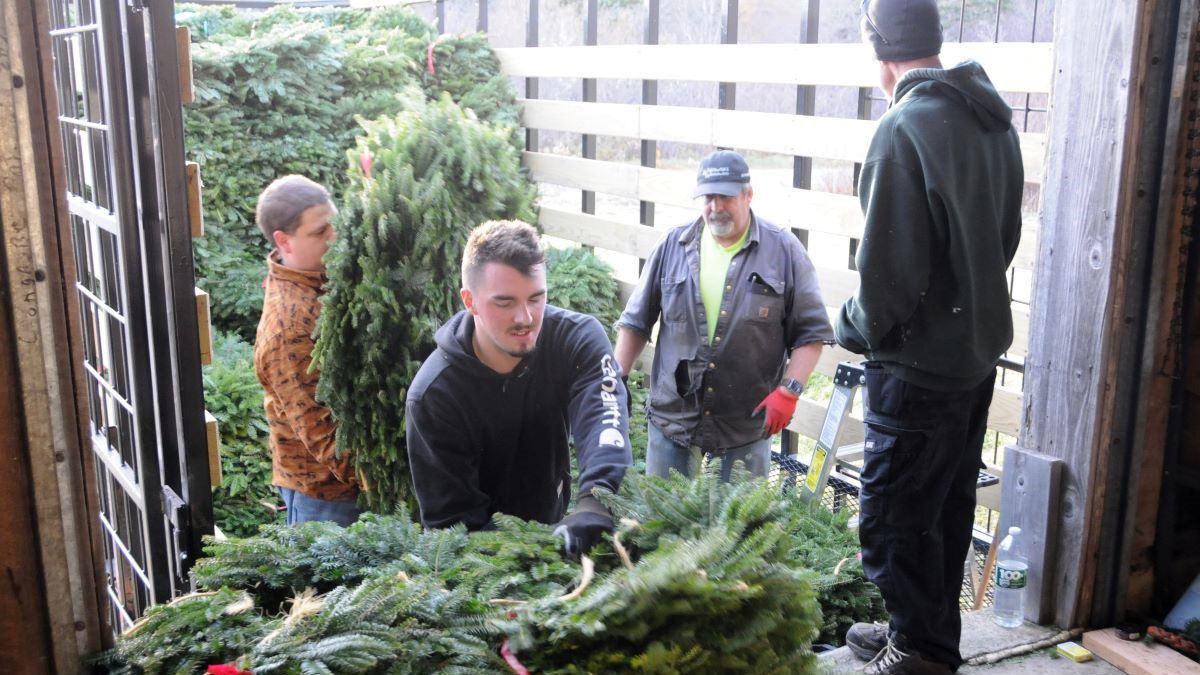Despite a season boasting some of the best quality tips in years, some area wreathmakers are struggling with not enough tippers and wreathmakers to meet demand.
The challenges are affecting businesses differently depending on the size of their operation, but for at least one historic wreathmaking family, it’s a portent of things to come.
“I’m probably the last generation, to be honest with you,” said Robert Dore, whose grandfather, Stafford Dore of Eastport, is credited with inventing and marketing the original balsam wreath in the 1930s. “Our orders have decreased substantially over the past few years.”
At its peak in the 1980s, Dore says, the business produced as many as 300,000 wreaths a year with the help of hundreds of workers from the area every season. Now, they’re lucky to do 10,000 wreaths a year with about 15 wreathmakers employed.
“Our orders have decreased due to labor shortages and brush issues, not demand,” Dore said. “It’s the raw materials.”
On the one hand, tips are harder to come by. When the state of Maine banned clearcutting practices, it affected accessibility, Dore said. In addition, “There are a lot less people allowing people to tip on their property, whereas 30 years ago everybody did it.”
On the other hand, people aren’t as willing to tip due to the increasing minimum wage in the state, Dore said.
“I don’t blame people; they’re going to take the path of least resistance like human nature tells us.”
As a result, Dore now relies on four tippers based in Canada, all of whom are over 70. “When they go, I don’t know where I’m going to get it.”
It’s a situation that Dore doesn’t see an easy resolution to. “I don’t see it changing at all,” he said. “There’s less and less people tipping on this side of the border. It’s starting to creep into Canada, too.”
Given enough tips, Dore says he has enough wreathmakers, but without the tips he’s taking fewer orders than he otherwise could. “It’s from a lack of product to be able to fill the order.”
At Mingo’s Evergreen Products in Calais, they’re facing a different problem, according to owner Artie Mingo, who recently took over the business from his father, Alden.
“We never have enough wreathmakers,” Mingo said. “We’re pulling more wreaths out of Canada now, and we’re hopefully going to get a little more migrant help” to offset the lack of local workers.
The Mingos have an arrangement with Canadian tippers to bring in a steady supply of truck trailers filled with tips across the border, providing them with all the tips they’ll need. Setting up the deal with Canadian tippers became a necessity a few years ago.
“We couldn’t depend on local tippers,” Mingo said. “There’s just not that many of them anymore.”
Year over year demand has been holding steady for Mingo wreaths — but only because they can’t fill the demand for more orders due to a lack of wreathmakers. “We use everything we could sell,” Mingo said. With more wreathmakers, they could make and sell more wreaths.
“We have our regular customers, and new calls are coming in for trees and wreaths,” Mingo said. They’re able to fulfill those orders, but aren’t actively marketing as much as they could to avoid running out of product before the season ends.
Along with traditional round wreaths, the Mingos produce Wreaths for Hope, ribbon‑shaped wreaths that the family developed in 2014. Some of the proceeds from Wreaths for Hope are donated to cancer research, and some of them go to a fund to help local residents travel to Bangor for cancer treatment.
Even as the struggle to find consistent wreathmakers continues this year, Mingo is pleased with the quality of the tips this season, owing to the cold, dry weather. “The brush is probably the best we’ve seen it in seven or eight years.”
At Boyden Lake Creative Products in Perry, meanwhile, the Bishop family has been hard at work on their wreathmaking season. A small, family‑run operation, everything the Bishops need is provided in‑house by their own efforts. As a result, they’re enjoying steady growth in their business.
The Bishops started with their wreathmaking enterprise between 10 and 12 years ago, said Kathy Bishop. Prior to that, she and her husband Herbie worked for other area wreathmakers, learning the craft, in addition to operating a Christmas tree farm since the 1980s.
Now, Herbie gathers the tips and makes the wreaths, while other family members help out. Kathy decorates the wreaths to get them ready for customers.
Their business is increasing year over year, especially “once people got to know we were here,” Kathy said. “Demand is looking good this year,” though she added it’s hard to tell until after Thanksgiving.







